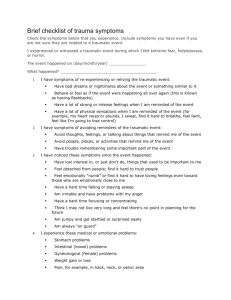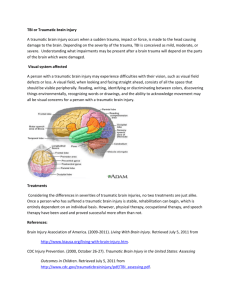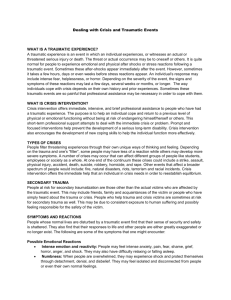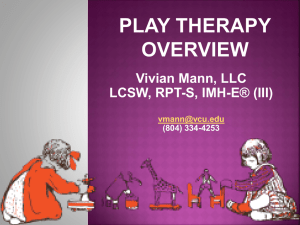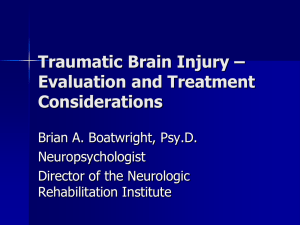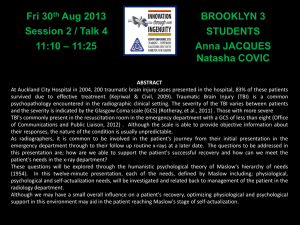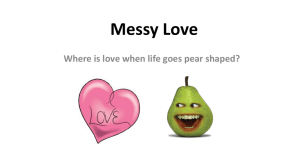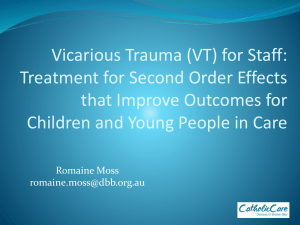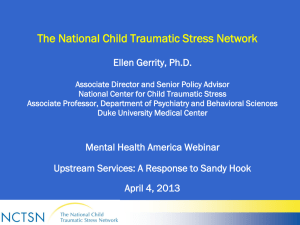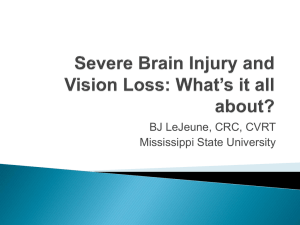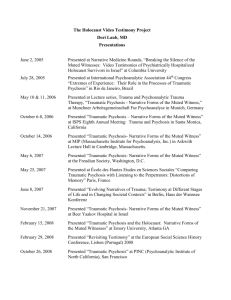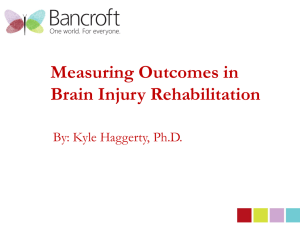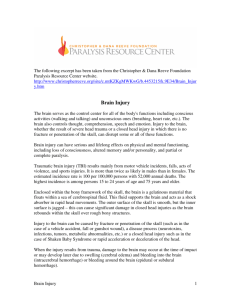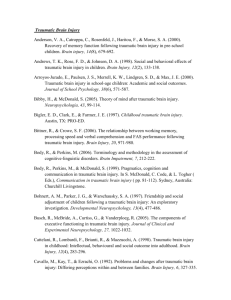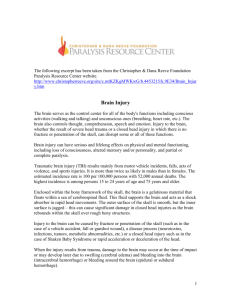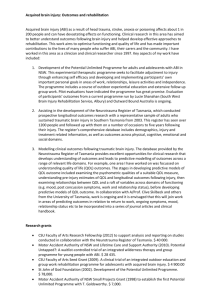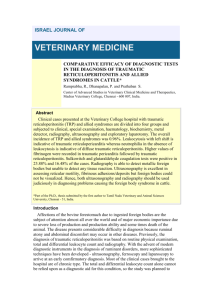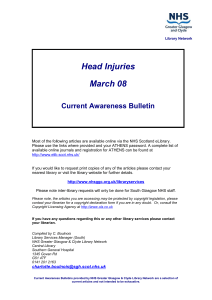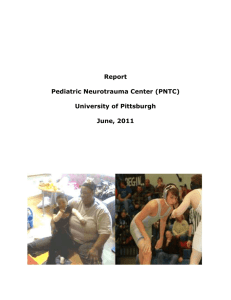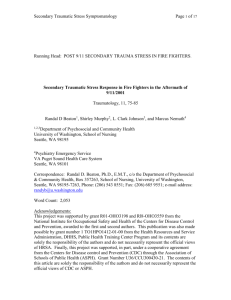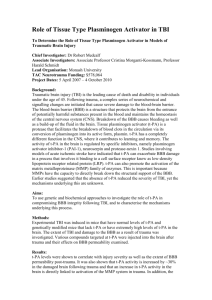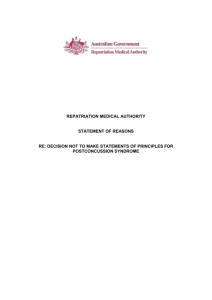Pediatric Traumatic Brain Injury - Brain Injury Alliance of Oregon
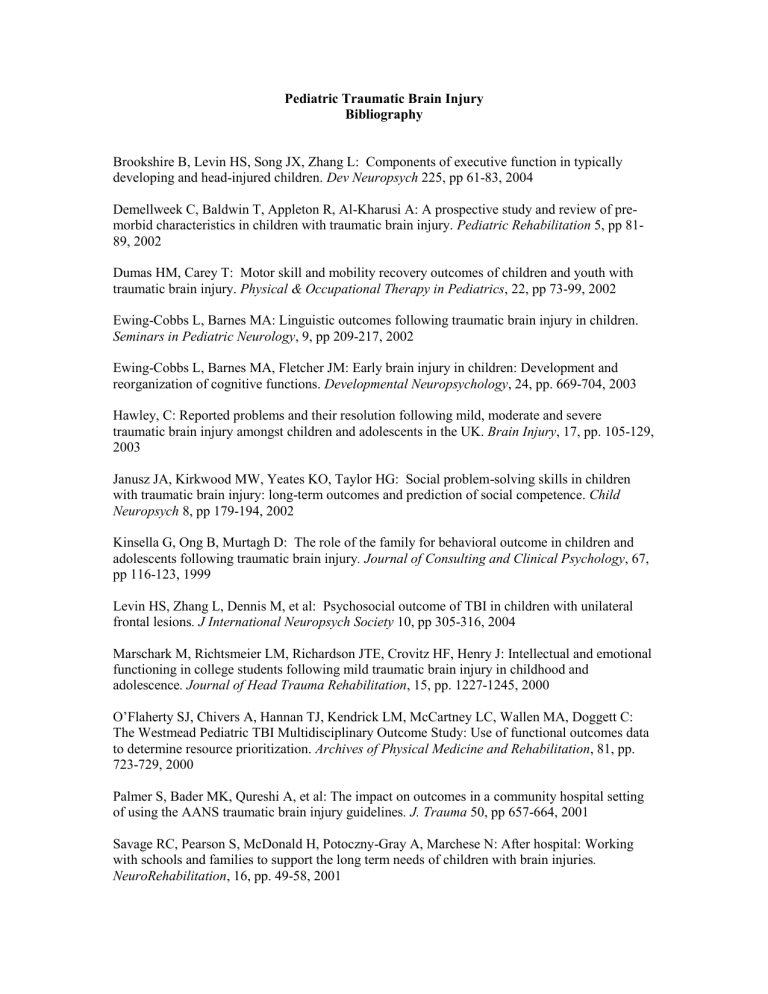
Pediatric Traumatic Brain Injury
Bibliography
Brookshire B, Levin HS, Song JX, Zhang L: Components of executive function in typically developing and head-injured children. Dev Neuropsych 225, pp 61-83, 2004
Demellweek C, Baldwin T, Appleton R, Al-Kharusi A: A prospective study and review of premorbid characteristics in children with traumatic brain injury. Pediatric Rehabilitation 5, pp 81-
89, 2002
Dumas HM, Carey T: Motor skill and mobility recovery outcomes of children and youth with traumatic brain injury. Physical & Occupational Therapy in Pediatrics , 22, pp 73-99, 2002
Ewing-Cobbs L, Barnes MA: Linguistic outcomes following traumatic brain injury in children.
Seminars in Pediatric Neurology , 9, pp 209-217, 2002
Ewing-Cobbs L, Barnes MA, Fletcher JM: Early brain injury in children: Development and reorganization of cognitive functions. Developmental Neuropsychology , 24, pp. 669-704, 2003
Hawley, C: Reported problems and their resolution following mild, moderate and severe traumatic brain injury amongst children and adolescents in the UK. Brain Injury , 17, pp. 105-129,
2003
Janusz JA, Kirkwood MW, Yeates KO, Taylor HG: Social problem-solving skills in children with traumatic brain injury: long-term outcomes and prediction of social competence. Child
Neuropsych 8, pp 179-194, 2002
Kinsella G, Ong B, Murtagh D: The role of the family for behavioral outcome in children and adolescents following traumatic brain injury . Journal of Consulting and Clinical Psychology , 67, pp 116-123, 1999
Levin HS, Zhang L, Dennis M, et al: Psychosocial outcome of TBI in children with unilateral frontal lesions . J International Neuropsych Society 10, pp 305-316, 2004
Marschark M, Richtsmeier LM, Richardson JTE, Crovitz HF, Henry J: Intellectual and emotional functioning in college students following mild traumatic brain injury in childhood and adolescence . Journal of Head Trauma Rehabilitation , 15, pp. 1227-1245, 2000
O’Flaherty SJ, Chivers A, Hannan TJ, Kendrick LM, McCartney LC, Wallen MA, Doggett C:
The Westmead Pediatric TBI Multidisciplinary Outcome Study: Use of functional outcomes data to determine resource prioritization. Archives of Physical Medicine and Rehabilitation , 81, pp.
723-729, 2000
Palmer S, Bader MK, Qureshi A, et al: The impact on outcomes in a community hospital setting of using the AANS traumatic brain injury guidelines . J. Trauma 50, pp 657-664, 2001
Savage RC, Pearson S, McDonald H, Potoczny-Gray A, Marchese N: After hospital: Working with schools and families to support the long term needs of children with brain injuries .
NeuroRehabilitation , 16, pp. 49-58, 2001
Schwartz L, Taylor HG, Drotar D, et al: Long-term behavior problems following pediatric traumatic brain injury: prevalence, predictors,, and correlates. J of Pediatr Psychology 28, pp
251-263, 2003
Yeates KO, Swift E, Taylor HG, et al: Short- and long-term social outcomes following pediatric traumatic brain injury. J International Neuropsych Society 10, pp 412-426, 2004
Yeates KO, Taylor GH, Wade SL, et al: A prospective study of short- and long-term neuropsychological outcomes after traumatic brain injury in children. Neuropsychology 16, pp
514-523, 2002
Ylvisaker M, Todis B, Glang A, et al: Educating students with TBI: Themes and recommendations. Journal of Head Trauma Rehabilitation , 16, pp. 76-93, 2001
Wade SL, Taylor HG, Drotar D, et al: Parent-adolescent interactions after traumatic brain injury:
Their relationship to family adaptation and adolescent adjustment. J Head Trauma Rehabil 18, pp
164-176, 2003
Wassenberg R, Max JE, Lindgren SD, Schatz A: Sustained attention in children and adolescents after traumatic brain injury: relation to severity of injury, adaptive functioning, ADHD and social background. Brain Injury 18, pp 751-764, 2004
Jcockrell 1/21/05
